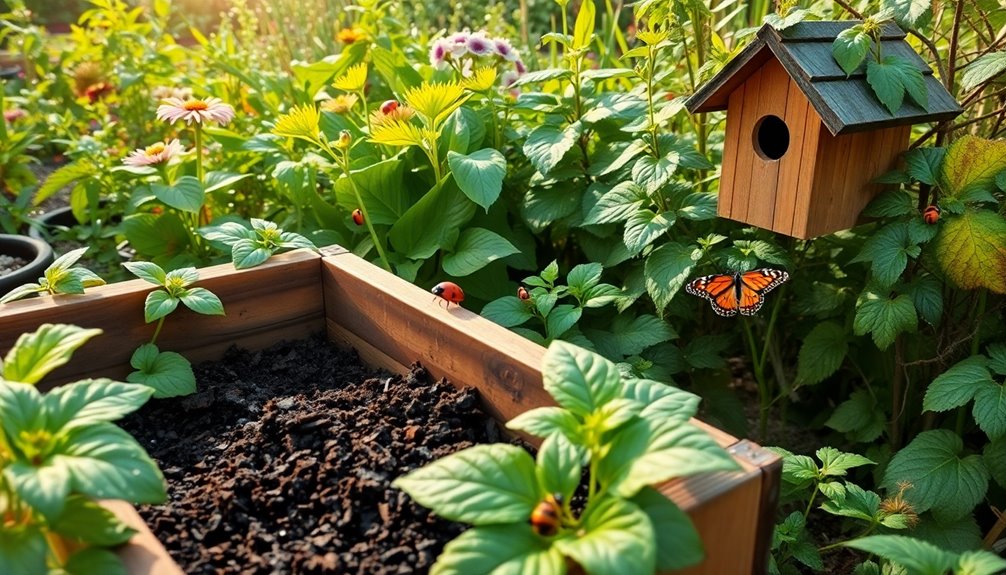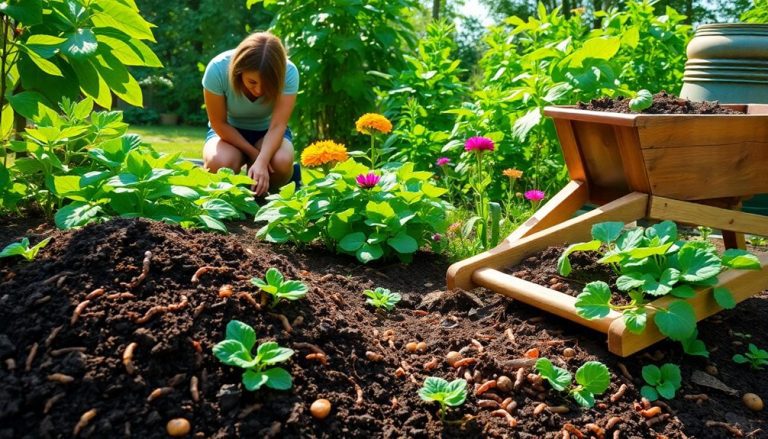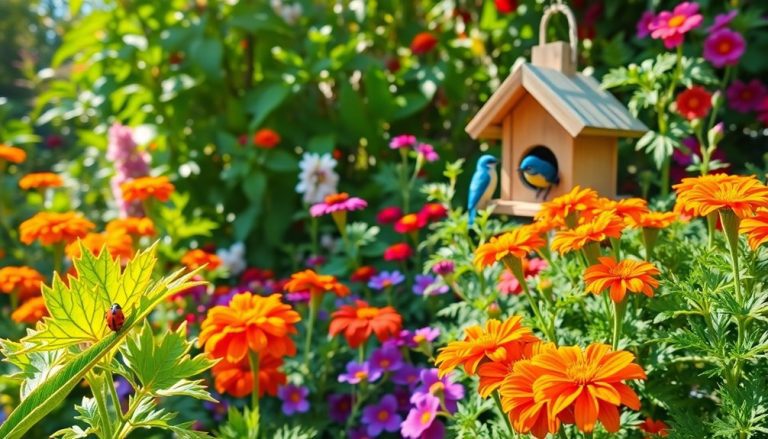Natural pest control methods are key to successful organic gardening. Start by identifying pests and monitoring your plants frequently. Introduce beneficial insects like ladybugs and lacewings to combat infestations naturally. You can also use homemade sprays, such as garlic or soap solutions, to deter unwanted visitors. Consider companion planting—combining certain plants can repel pests while attracting allies. Implement physical barriers like row covers or traps to safeguard your crops without chemicals. By practicing these strategies, you'll enhance your garden's health and resilience. There's so much more you can explore to optimize your pest control efforts!
Key Takeaways
- Regularly inspect plants for signs of pests and remove affected foliage to prevent disease spread.
- Introduce beneficial insects like ladybugs and lacewings to naturally control pest populations.
- Use homemade natural sprays, such as garlic or neem oil, to deter pests effectively.
- Implement physical barriers, like row covers and fences, to protect crops from larger pests.
- Maintain detailed records of pest sightings and control methods to evaluate effectiveness and adjust strategies as needed.
Understanding Pest Control Principles
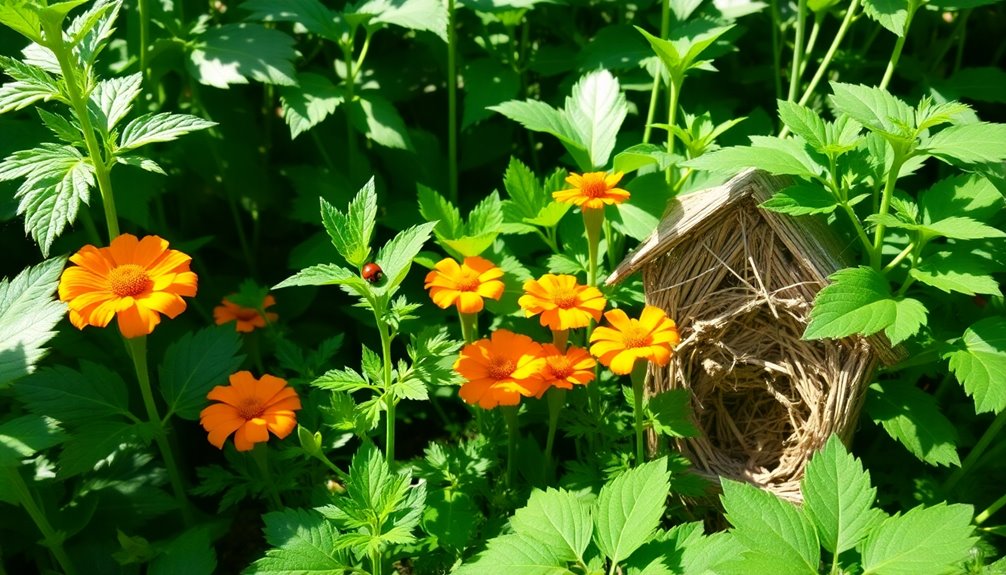
Understanding the principles of pest control is essential for effectively managing unwanted pests in your home or garden. Start by recognizing that pests disrupt the balance of your ecosystem. To tackle this, you must identify the specific pests you're dealing with and understand their behaviors and life cycles. This knowledge helps you determine the most effective control methods.
Next, you'll want to assess the environment. Healthy plants and soil are less susceptible to pest infestations. By maintaining proper care, you can create an environment that naturally deters pests. Implementing cultural practices, such as crop rotation and companion planting, can also minimize pest populations.
Monitoring is key; regularly inspect your plants for signs of pests. This proactive approach allows you to catch infestations early before they escalate. When you find pests, consider using natural predators or barriers as your first line of defense. Sometimes, simple solutions like removing affected plants or using homemade sprays can be effective.
Lastly, keep in mind that prevention is always better than cure. By understanding these principles, you'll be better prepared to maintain a healthy, pest-resistant garden or home.
Beneficial Insects for Gardens
Beneficial insects are nature's little allies in the garden, helping to control pest populations and promote healthy plant growth. By attracting these helpful critters, you can create a balanced ecosystem that reduces the need for chemical pesticides.
Ladybugs, for instance, are voracious eaters of aphids and other soft-bodied pests. A single ladybug can consume up to 5,000 aphids in its lifetime!
Lacewings are another beneficial insect, targeting aphids, thrips, and mealybugs. Their larvae, known as "aphid lions," are particularly effective at keeping pest numbers in check.
You might also want to invite parasitic wasps into your garden. These tiny wasps lay their eggs inside pest larvae, effectively controlling populations without harming your plants.
To attract beneficial insects, consider planting a variety of flowers, herbs, and native plants. Plants like dill, fennel, and cosmos provide nectar and pollen, making your garden a welcoming habitat.
Avoid broad-spectrum insecticides, as they can harm beneficial insects too. Instead, focus on creating a diverse garden environment that encourages these helpful allies to thrive, ensuring a healthier and more productive garden for you.
Homemade Natural Sprays
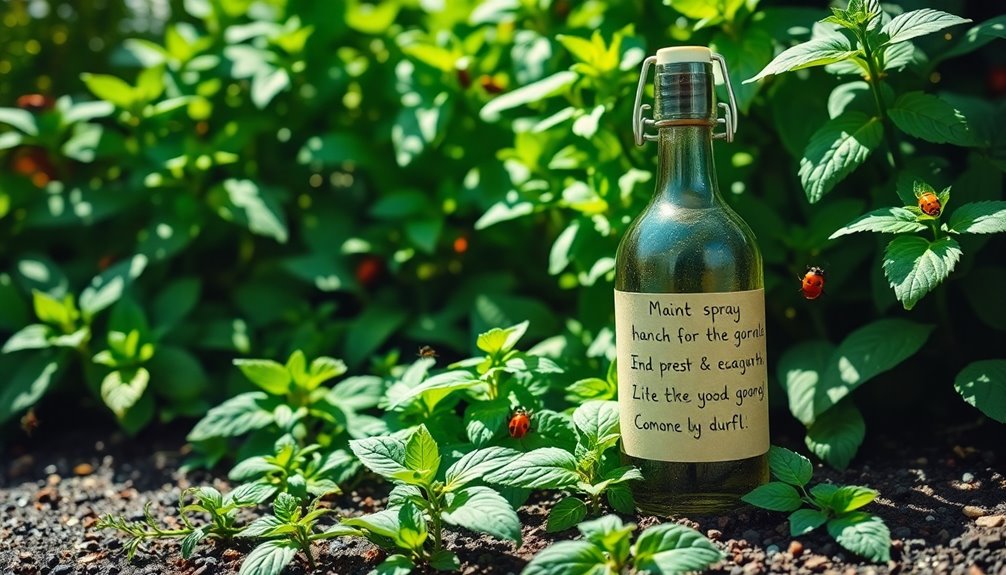
Attracting beneficial insects is a great way to maintain a healthy garden, but sometimes you might still need to step in with additional measures. Homemade natural sprays can be an effective solution to tackle pests without harming the environment. You can create simple sprays using common household ingredients that deter unwanted visitors.
Here are a few popular homemade natural sprays you can try:
| Spray Type | Ingredients |
|---|---|
| Garlic Spray | 2 bulbs of garlic, 1 quart of water |
| Soap Spray | 1 tablespoon of liquid soap, 1 quart of water |
| Chili Pepper Spray | 1 tablespoon of chili powder, 1 quart of water |
| Neem Oil Spray | 2 teaspoons of neem oil, 1 quart of water |
To use these sprays, mix the ingredients thoroughly and apply them directly to the affected plants, ensuring you cover both the tops and undersides of leaves. It's best to test a small area first to check for any adverse reactions. Reapply every few days or after rain to maintain effectiveness. With these homemade solutions, you can keep your garden thriving and pest-free!
Companion Planting Strategies
Companion planting can significantly enhance your garden's health and productivity. By strategically placing plants together, you can deter pests, improve growth, and promote beneficial interactions.
Here are some effective companion planting strategies to consider:
- Plant Aromatic Herbs: Include herbs like basil, mint, or rosemary near vegetables. Their strong scents can help confuse pests and repel unwanted insects.
- Use Trap Crops: Plant a few crops specifically to attract pests away from your main plants. For example, radishes can lure aphids away from your cabbages.
- Mix Flowers with Vegetables: Incorporate flowers such as marigolds or nasturtiums in your vegetable garden. They attract beneficial insects that prey on pests and enhance pollination.
- Pair Complementary Plants: Certain plants thrive when grown together. For instance, tomatoes and peppers can benefit from shared nutrients and space, while beans can fix nitrogen in the soil for corn.
Physical Barriers and Traps
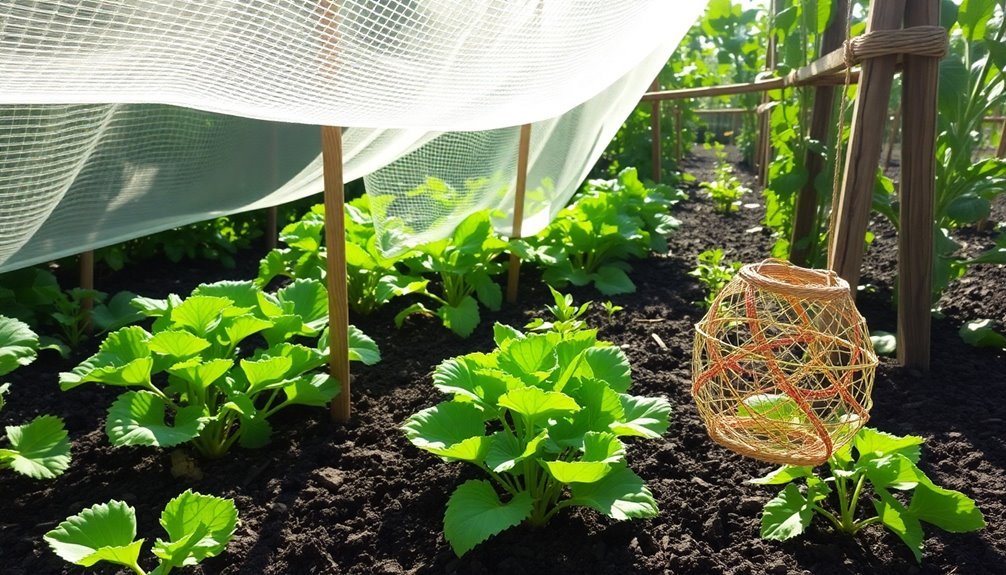
While companion planting offers natural ways to boost your garden's defenses, utilizing physical barriers and traps can provide additional protection against pests. These methods are simple yet effective, allowing you to keep unwanted critters at bay without resorting to chemicals.
You can start by using row covers, which are lightweight fabrics that protect your plants from insects while allowing sunlight and moisture to reach them. Just drape the covers over your crops, securing the edges to prevent pests from sneaking underneath.
Another option is to set up barriers like fences or netting to keep larger pests, such as rabbits and deer, away from your garden. These physical barriers help safeguard your plants right from the start.
Traps are also a great tool in your pest control arsenal. You can create simple traps using containers filled with soapy water to capture flying insects or use sticky traps to catch crawling pests.
Just remember to check these traps regularly to ensure they're effective.
Essential Oils and Natural Repellents
Essential oils and natural repellents can serve as powerful allies in your quest for pest control.
These concentrated plant extracts not only deter pests but also provide a pleasant aroma to your garden. You can easily incorporate them into your gardening routine.
Here are four effective options to consider:
- Peppermint Oil: This oil repels ants, spiders, and mice. Mix a few drops with water and spray around your garden's perimeter.
- Lavender Oil: Known for its calming scent, lavender oil can deter moths, fleas, and mosquitoes. Use it in sachets or diluted sprays.
- Citrus Oil: Oils derived from lemons or oranges can repel a variety of insects, including aphids and ants. Simply apply diluted citrus oil around affected plants.
- Eucalyptus Oil: This oil has a strong scent that bugs can't stand. A diluted spray can help protect your plants from common pests like flies and beetles.
Experiment with these natural repellents, and you'll find that they not only keep pests at bay but also enhance the overall environment of your garden.
Maintaining Garden Health
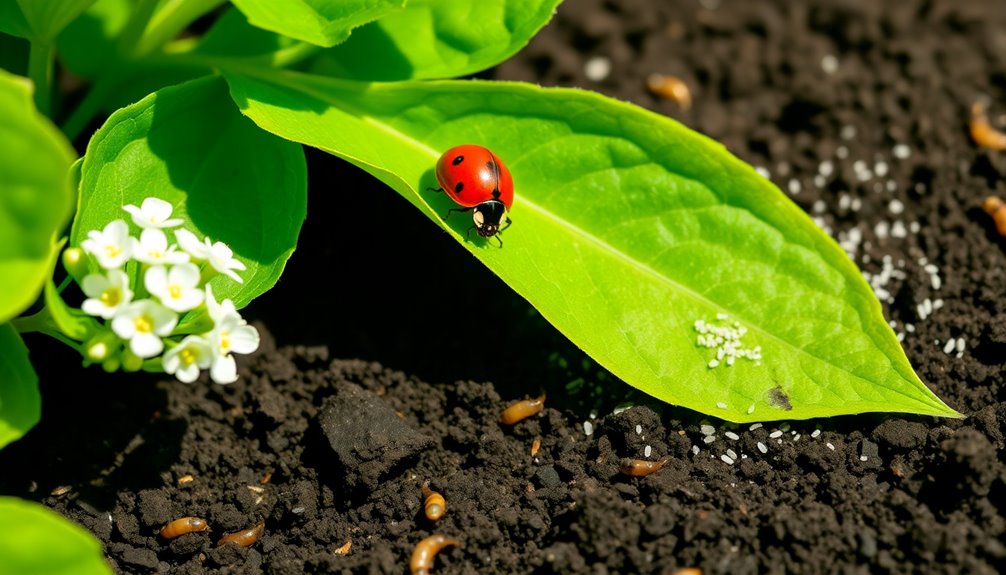
To keep your garden thriving, maintaining its health is crucial for both plant vitality and pest resistance. Start by ensuring your soil is rich and well-draining. Regularly test your soil's pH and nutrient levels to identify any deficiencies. Adding organic matter like compost can boost soil health, providing essential nutrients for your plants.
Next, practice proper watering techniques. Overwatering can lead to root rot and attract pests, while underwatering stresses your plants. Aim for deep, infrequent watering to encourage strong root systems. Mulching helps retain moisture, suppress weeds, and regulate soil temperature, contributing to overall garden health. Using quality mulch products can further enhance moisture retention and support plant growth.
Incorporate companion planting to enhance biodiversity and create a balanced ecosystem. Certain plants can naturally repel pests or attract beneficial insects, like ladybugs and bees, which aid in pollination and pest control.
Regularly inspect your plants for early signs of distress or pest infestations. Remove any dead or diseased foliage promptly to prevent the spread of issues.
Monitoring and Adjusting Techniques
Maintaining a healthy garden requires ongoing attention, particularly in monitoring and adjusting your techniques as needed.
By keeping a close eye on your plants, you can identify pest issues early and adapt your strategies accordingly.
Here are four key steps to help you stay on top of your garden's health:
- Regular Inspections: Walk through your garden frequently to check for signs of pests or disease. Look under leaves and in the soil for any unusual activity.
- Record Observations: Keep a journal of your findings, including plant growth, pest sightings, and weather conditions. This information helps you recognize patterns and adjust your methods effectively.
- Adjust Treatments: If you notice a particular pest increasing, consider altering your control methods. This might mean introducing beneficial insects or changing your application frequency of natural repellents.
- Evaluate Outcomes: After implementing changes, assess their effectiveness. If a method isn't working, don't hesitate to try something new until you find what suits your garden best.
Frequently Asked Questions
How Do I Identify Which Pests Are Affecting My Garden?
To identify pests in your garden, observe your plants closely for damage, droppings, or unusual growth. Check for signs like holes, discoloration, or webbing, and compare your findings with online resources or pest identification guides.
Are There Any Pests That Are Beneficial for All Plants?
Yes, some pests benefit your garden. Ladybugs eat aphids, lacewings control mites, and predatory wasps reduce caterpillar populations. By encouraging these helpful insects, you'll promote a healthier ecosystem, protect your plants, and enhance your garden's vitality.
Can Natural Methods Completely Eliminate Pests?
Natural methods can significantly reduce pest populations, but they rarely completely eliminate them. You'll find that some pests can coexist with plants, and a balanced approach often leads to healthier ecosystems in your garden.
How Often Should I Apply Homemade Natural Sprays?
Studies show that applying homemade natural sprays every seven to ten days can significantly reduce pest populations. So, you should stick to this schedule, especially after rain or heavy watering, to maintain effectiveness.
Are There Any Specific Plants to Avoid in Companion Planting?
When companion planting, avoid placing plants like onions near beans or garlic next to peas. These combinations can hinder growth and reduce yields, so choose your companions wisely for a thriving garden.
Conclusion
By embracing natural pest control methods, you'll nurture your garden while keeping harmful critters at bay. As beneficial insects thrive alongside your plants, homemade sprays and companion planting create a harmonious balance. Physical barriers protect your crops, while essential oils offer a fragrant defense. Just as you monitor garden health, adjusting techniques ensures resilience. In this dance of nature, you'll find that fostering life helps you combat pests, creating a vibrant ecosystem where both you and your plants can flourish.

